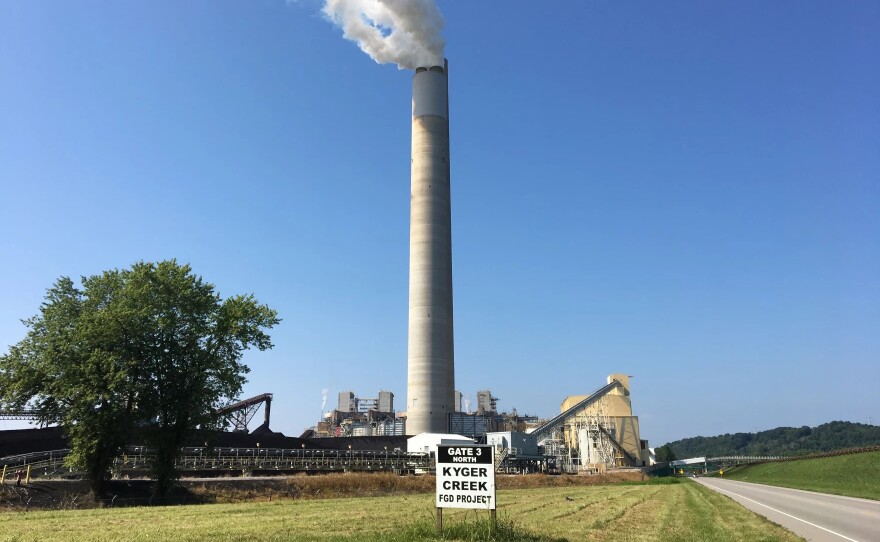When power plants burn coal to generate electricity, the plants leave behind toxic ash. It took decades for the Environmental Protection Agency to create and enforce regulations to keep those toxins out of drinking water.
But the EPA could be preparing to get rid of those rules -- at the urging of coal-burning power generators. That includes one company getting subsidies from Ohio’s electric customers.
Opponents say that would be disastrous for human health and water supplies.
A group of 10 large-scale, coal-burning utilities came together days before President Donald Trump was inaugurated, and weeks before he appointed Lee Zeldin to lead the EPA.
, asking the incoming administration to get rid of a slate of rules that regulate emissions and how the companies handle and store the waste produced by the plants.
The Ohio Valley Electric Corporation (OVEC), one of the companies, operates two coal plants on the Ohio River. One is in Ohio and the other is in Indiana.
State law requires Ohio's electric customers to subsidize operations at the unprofitable plants. Consumers have paid hundreds of millions of dollars to OVEC since 2019.
It looks like the utilities' request could be honored. Earlier this month, the launch of what he’s billing as the “biggest deregulatory action in U.S. history.”
“EPA will be reconsidering many suffocating rules that restrict nearly every sector of our economy," Zeldin said.
are on Zeldin's list, along with how much mercury a coal plant can emit and what information the companies have to report.
“Under President Trump’s leadership, EPA will advance cooperative federalism to allow states to lead the charge on local issues, with federal support. This is just one of many examples where this agency can and will work with our state partners to deliver for the American people,” Zeldin said in a news release.
Zeldin said the "EPA will work with state partners to place implementation of the coal ash regulations more fully into state hands."
Lawyers at Earthjustice, a law firm that handles environmental cases, said these moves will cost the public, contaminate the water and sicken people.
“The problem with coal ash is that coal naturally contains hazardous substances like mercury, arsenic, lithium, cobalt, chromium, radium," said Lisa Evans, an attorney for Earthjustice. "And when the coal is burned, those dangerous heavy metals get concentrated in the ash.”
Evans said because coal ash was unregulated for so long, companies did what they wanted with the material. She estimates it was a period of at least 100 years.
“So it was disposed in unlined pits and ponds, used for fill. It was generally spread everywhere in most states without any kind of protective requirements to prevent those heavy metals from getting into our air and water and soil," Evans said. "And that's exactly what it did."
Jill Tauber, another Earthjustice attorney, said the consequences are high.
“Unsurprisingly, it's contaminated water, soil, it's sickened communities, causing cancer linked to kidney disease, reproductive harm, damaged the nervous system," Tauber said.
She said if the government doesn’t regulate coal ash by requiring liners and covers, communities will shoulder the burden.
“It means more contamination. It means more harm. It means more costs for cleanup,” Tauber said.
Evans said the issue is .
“The most prevalent that we're finding in contaminated groundwater from many years of industry monitoring is arsenic, lithium, molybdenum, lead, radium and boron. You find these at many sites and particularly arsenic, which is an extremely dangerous chemical," she said.
And there are all around Ohio, including along the Ohio River, which supplies drinking water to five million people in Ohio and other states, according to the .
Once contamination happens, Evans said it can takes years to clean up. Like in .

“The contamination happened decades ago. EPA got involved decades ago, but the site still isn't cleaned up," Evans said.
They can no longer use groundwater for drinking water, and Evans said, there are high levels of arsenic in the soil.
“So this is a problem that, unless you prevent it or act quickly to stop the spread of contamination, you will have a very difficult problem to clean up over years," Evans said.
The coal plant companies said the country should do away with the regulations to expand the power grid and support the country’s economic growth.
Abigail Dillen, president of Earthjustice, said the country shouldn't sacrifice the health of people so utility companies can pocket more profits.
“What has been proven over and over again is that the industry can deploy the best science and the best technology, continue to have a very profitable business model, while affording us all of the collective benefits, including economic benefits, of a clean and healthy environment," Dillen said.
Zeldin said he plans to end efforts to actually enforce the EPA’s rules.
"Redirecting enforcement resources to EPA’s core mission to relieve the economy of unnecessary bureaucratic burdens that drive up costs for American consumers (Enforcement Discretion)," Zeldin's news release states.
Dillen said that's against U.S. law.
“On the other hand, what we've been seeing from this administration is that lawlessness is part of the approach. They don't care if they're breaking the law,” Dillen said.






